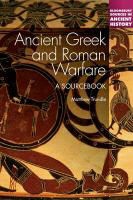Read more
Warfare was of central importance to ancient societies and recent years have seen an explosion of interest in almost every aspect of ancient warfare. This book, however, will fill an important gap, by providing a broad selection of source material with explanatory commentary covering the whole period of antiquity. What makes this book different is its focus on continuity and change through the long duration, the detailed commentaries on the evidence presented, as well as a holistic focus on war, society, economics and religion alongside tactical and strategic considerations. It will highlight problems and debates about ancient warfare, providing readers with the source material on key and controversial subjects, such as the origins and development of hoplite warfare or the introduction of the poor into the Roman Republican armies.
List of contents
Introduction; 1: Attitudes to Warfare; 2: The Homeric and Early Greek World 1300-500 BCE; 3: The Hoplite and Greek World 700BCE-412 CE; 4: Naval Warfare; 5: The Transformation of Greek Warfare 412-338 CE; 6: Philip and Alexander the Great; 7: Hellenistic Warfare; 8: Early Italian and Roman Warfare; 9: Roman Army of the Great Wars 264-146 BCE; 10: The Late Republic; 11: The Early Empire; 12: Late Antique Warfare; 13: Conclusion - Continuity and Change.
About the author
Dr Matthew Trundle is Senior Lecturer in Classics at Victoria University of Wellington, New Zealand. His research specialities are the history of Greece, Rome and the Near East, as well as Greek warfare and historiography. His most recent publication is Greek Mercenaries: From the late Archaic Period to Alexander (Routledge, 2004)
Summary
An holistic focus on war, society, economics and religion alongside tactical and strategic considerations.

